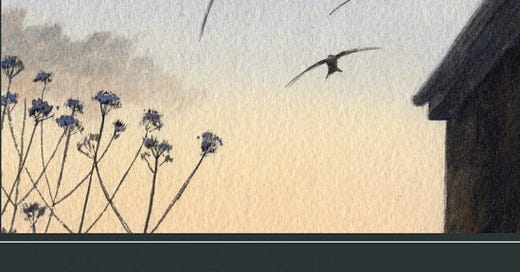Themes: Common Swifts, birding, obsession, travelogue, misanthropy
Read this if: You appreciate niche passions.
Don’t read this if: You have no desire to learn about birds.
Links to purchase: Little Toller Books, Amazon
One of the amazing things about humanity is the variance in what gives us joy. One person’s perfect afternoon is another person’s hell. People have hobbies and obsessions that other people find incomprehensible. The internet has only made this more obvious. It has allowed people to transcend their location and connect with like-minded individuals across the globe. It has given rise to communities of people organised around their singular obsession, be it basketball, synchronised swimming, K-Pop, or even the Common Swift. Yes, you’ve read that correctly. There are people spread all over the globe who share a fascination of, and appreciation for the Apus Apus, to use the Swift’s scientific name. The Screaming Sky is the work of one such swift obsessive; Dr. Charles Foster of Oxford, England.
A very fair question to ask is why on earth did someone take the time to write an entire book about the Common Swift. After all, it is just a bird, and a ‘common’ one no less. To that question, Charles Foster provides a ready answer in the foreword, “Each and every species on earth deserves an infinity of books. Every one is infinitely complex and wonderful, and the life of every one is intimately interwoven with the life of everything else.” So this justifies why someone might choose to write a book about a singular species of bird, but what about readers? Why should someone choose to use their finite time to read an entire book dedicated to the Apus Apus.
Well, Dr. Foster has anticipated this question as well. His response, “we can only get at the general through the particular… we have to start our search for overarching principles in small, discrete, local, embodied ways… the best books about relationships are written not by people who wake up in a different bed each morning, but by those who have worked hard and long at one relationship.” To me this has the ring of truth, and as such we should listen to what Charles has to say on the topic of swifts, because it is a relationship that he has clearly ploughed time, effort, and money into, even if his love has not been reciprocated by the objects of his obsessions.
The book is broken up into the months of the year and follows the swifts’ annual migratory cycle. It therefore starts in January, in Africa, Mozambique to be specific. The author goes to observe the swifts as they gorge themselves on the insects over the rainforest. He is never able to get too close. The swifts spend their winters high in the air. In fact, swifts spend their lives in the air, up to 10 months airborne at a time, only touching the ground in order to lay eggs and reproduce, otherwise they remain high overhead. Now, you may be thinking, where do they sleep. Well, one of the factoids learned in this book is that Swifts can sleep while flying, they shut off half their brain and enter the bird equivalent of an autopilot.
By book’s end we have followed the swifts through their entire annual cycle. From the rainforest of Africa to the coasts of Liberia, and then spreading out across Asia and Europe including Charles Foster’s home in Oxford.
As for the author, he is as much the main character as the birds he follows. The book is about swifts, but it’s also about his relationship with them. Here is a passage from the first chapter that is illustrative,
I can’t remember the last time I experienced anything particular and concrete. Everything’s generic and abstract for me. My world’s made of words and my own wretched ideas. These birds don’t fly through their idea of the sky: they fly through the sky. They eat flies, not a collection of adjectives for describing flies. They have no words to separate them from the sun that rose out of Madagascar this morning, from the monkeys picking out their friends’ lice on the beach, from the crabs hiding under the mangroves from the herons, from the elephants in baggy trousers crashing through the mahogany trees behind me.
If anyone has a passion for birding, then I would say this is a must read. For those with a more pedestrian interest in birds, it’s still worth a read although may not be at the top of the reading list. It’s always interesting to delve into someone’s passion, even if it’s not a shared one. The furore with which Dr. Foster loves swifts is, to some degree, infectious. I don’t think I’ll be organising a trip to Africa in order to watch them, but I’ll certainly be keeping an eye out next June when the birds make their return to London.


